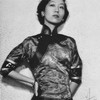An excerpt from Naked Earth
'Beat down Depraved Elements! Purify the ranks of the Party!'
A bestial impulse and weakness of will prompted him to make advances at her when he saw her home that evening. The advances, he was ashamed to say, had been successful.
He knew from his own experience just now that you could not distinguish between the faces amassed below the platform. But he kept feeling Ko Shan's glance brushing over his face. Nobody had ever been executed for improper man-woman relations, he reminded himself. But Su Nan would soon hear of this. What would she think? Perhaps he could have made her understand if he had been smart enough to have told her about it himself. It was an entirely different matter with all the sordid details dragged out in a mass meeting and with everybody talking about it afterwards, laughing over it. She might forgive him, but it would never be the same again between them. He should have told her. Now he had lost the opportunity forever."Let's have it! Your lover's name! Your lover's name!" As Chinese nouns have no plural form, they could have meant either "lover" or "lovers." But Liu knew they would never be satisfied with one. They always clamored for more, always taking for granted that you were keeping something back."All right, I'll t'an-pai!" Ko Shan suddenly shouted, her voice harsh and tight with the effort of speaking loud enough to be heard. Her face was slightly flushed and still faintly smiling. "It's Chang Li." The shouted words hung suspended awkwardly in the sudden hush.The name meant nothing to many of those present. There was a hubbub of mistrustful questioning.Then somebody shouted, 'Pu hsing! Pu hsing! Won't do! Won't do! Confession not concrete enough!'
The mass meeting continued the next day. They had not yet gone through half the personnel. Liu was surprised to find that Ko Shan was present at the meeting and quite active too, making accusations and shouting out questions. Later he heard from other people that she had got off lightly, had merely been told to submit a full confession in written form.Chang did not come back to the hostel that second night either. It turned out that he had been temporarily detained in a spare room in the office building. The Party unit was conducting an investigation into his other depravities. He went under discussion every evening until late at night. He was required to contribute to those discussions with interminable self-criticism. In the daytime he was shut in his cell for Isolated Retrospection.Liu thought he was extremely lucky to be out of it. "I really ought to go and see Ko Shan and thank her," he thought guiltily.There seemed to be a curfew on during the Three Antis. Everybody stayed home after the office and kept himself to himself. In times like these you never could tell what would happen to somebody who had seemed perfectly all right a minute ago. Even a telephone call might implicate you. When Liu came to the house where Ko Shan lived, he felt he was sneaking through a blockade.The Party unit was conducting an investigation into his other depravities. In the daytime he was shut in his cell for Isolated Retrospection.
It was so cold in the unheated room that she was dressed as if to go out, wearing fur-lined suede boots and a plaid muffler over her padded uniform. She returned to her chair and took up her knitting. There were sheets of paper covered with writing on the table next to her. She had been working on her confession, pondering some changes while she knitted.The room had such a chastened air, Liu almost felt like laughing. It seemed emptier and tidier than he ever remembered it and was everywhere covered with clean-looking undisturbed dust. Ko Shan could very well be a college senior staying behind in the deserted dormitory working on her thesis while everybody was away during the winter vacation. These Party members, he could not help thinking, how they do change their lives with the policy of the moment, so quickly and with a kind of nonchalant docility—you would think only children could carry it off."I've got to thank you for what happened yesterday," he said. "For leaving me out, I mean."It seemed emptier and tidier than he ever remembered it and was everywhere covered with clean-looking undisturbed dust.
